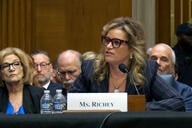You have /5 articles left.
Sign up for a free account or log in.
Male students appear to consistently and significantly overrate the abilities of other male students, whereas female students showed no such bias, according to a new study in the journal PLoS ONE.
Researchers at the University of Washington surveyed more than 1,700 students in three introductory biology classes, asking them to nominate those who they felt were doing exceptionally well in the class. Even after controlling for outspokenness and actual graded performance, male students in each of the classes consistently overestimated the performance of other men to the tune of an assumed 0.765 bump in grade point average. Effectively, for an outspoken female student to be nominated at the same rate as an outspoken man, her class GPA would need to be three quarters of a point higher than that of the guys.
Female students, on the other hand, demonstrated no statistically significant bias. "in their views"? is that what we mean? dlResearchers found they were equally likely to nominate male and female students with equivalent GPAs.
The most-nominated students in each of the three classes were also always male. And, the researchers point out, “while male students on average scored slightly higher than female students and were more likely to be outspoken in every class, outspoken females with grades as high as these most renowned male students exist in every class. However, females achieving high grades and outspoken status never gain the same celebrity status as their male counterparts. It appears that being male is a prerequisite for students to achieve celebrity status within these classrooms.”
The authors of the paper suggest that this bias in the male students’ estimation of one another could translate to a lack of affirmation and support for female students in the science, technology, engineering and mathematical fields, which in turn may contribute to the high rate of female attrition in those fields.
From the paper’s conclusion: “The coalescence of subtle messages about their STEM abilities from both faculty and peers may undermine the self-confidence females have to persist in STEM fields beyond their undergraduate education.
“The patterns of uneven peer perceptions by gender shown in our student population suggest that future populations of academics may perpetuate the same gender stereotypes that have been illuminated among current faculty. This may not only be the case because the male students receiving high celebrity are reaffirmed in their abilities and are better able to advance through the STEM pipeline than women who do not receive this affirmation, but also because the existence of ‘celebrity’ males and other individuals with distinction can impact and reaffirm the stereotypes held by others.”
The full paper can be found here.




